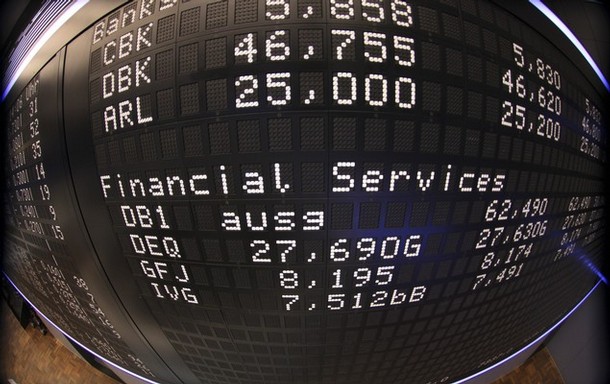
The New York Stock Exchange may soon merge with Deutsche Boerse, creating the world’s largest financial exchange and setting up a tidal wave of consolidation.
NPR reports that "NYSE Euronext, the company that owns the New York Stock Exchange and stock and derivatives markets throughout Europe, has confirmed it’s in advanced talks with Deutsche Boerse, which owns the Frankfurt Stock Exchange." The Germans would own 60 percent of the combined company, which would be incorporated in the Netherlands and run by Deutsche Boerse’s Reto Francioni.
The news comes hours after the London and Toronto exchanges merged and is likely to spur on further moves. The Singapore Stock Exchange (SGX) has already bid $8.4 billion for the Australian Securities Exchange (ASX), The Australian reports.
The vision is a stock and derivatives equivalent of the Chicago Mercantile Exchange, which dominates the agriculture futures market. According to Larry Tabb, quoted by NPR, increased competition has made stock trading less profitable, making consolidation — and thus decreased competition — attractive.
The merger will have to be approved by American and European regulators. While analysts expect it to happen, there will be questions.
Representative Ted Deutch, a Florida Democrat, has already issued a statement demanding that the combined exchange keep the "New York Stock Exchange" name that has been around since 1863, arguing “The New York Stock Exchange is a foundation of the extraordinary American economic success story, and its name rightfully reflects the United States’ position as the financial center of the world.”
While Deutch isn’t on a committee that has jurisdiction over the matter, his sentiment is likely to be widely shared by his colleagues — despite both the irony of his name and the fact that Deutsche Boerse dates to 1585, not only 300 years before NYSE’s founding but decades before the first American colony was founded.
Indeed, despite being an Atlanticist by inclination and profession, the thought of losing this iconic institution and the symbolism that represents is hard to swallow. But the fact of the matter is that, as demonstrated all too well by the recent global recession, the financial markets are now fully global. It really doesn’t matter where exchanges are located nowadays, since trading is seamlessly interlinked electronically.
Reuters analysts Huw Jones and Luke Jeffs see this as "the endgame for global exchanges," arguing that other major mergers will be more politically difficult. But it’s unclear why that should be the case. Presuming the NYSE-DB merger goes through, the combined London-Toronto exchange would become a transatlantic afterthought. Nor is it entirely clear why NASDAQ would continue to go it alone. Bringing in the Asian exchanges would be more difficult, of course, given the political and cultural obstacles. But a combined SGX-ASX could certainly join the transatlantic behemoth.
This wave of mergers could well be the first of many.
James Joyner is managing editor of the Atlantic Council. Photo: Getty Images.
Image: nyse-deutsche-bourse.jpg

